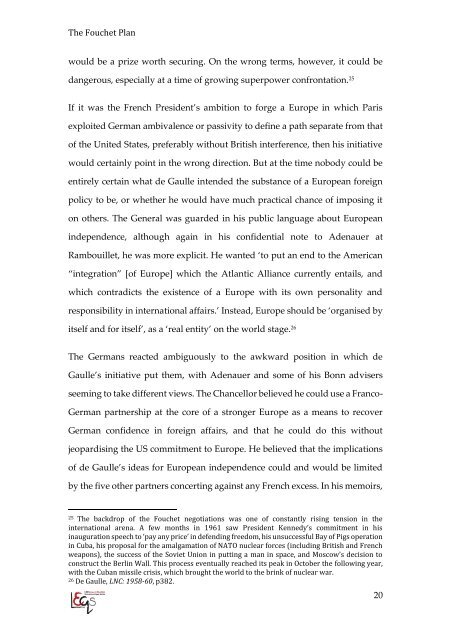The Fouchet Plan De Gaulle’s Intergovernmental Design for Europe
n?u=RePEc:eiq:eileqs:117&r=cdm
n?u=RePEc:eiq:eileqs:117&r=cdm
Create successful ePaper yourself
Turn your PDF publications into a flip-book with our unique Google optimized e-Paper software.
<strong>The</strong> <strong>Fouchet</strong> <strong>Plan</strong><br />
would be a prize worth securing. On the wrong terms, however, it could be<br />
dangerous, especially at a time of growing superpower confrontation. 25<br />
If it was the French President’s ambition to <strong>for</strong>ge a <strong>Europe</strong> in which Paris<br />
exploited German ambivalence or passivity to define a path separate from that<br />
of the United States, preferably without British interference, then his initiative<br />
would certainly point in the wrong direction. But at the time nobody could be<br />
entirely certain what de Gaulle intended the substance of a <strong>Europe</strong>an <strong>for</strong>eign<br />
policy to be, or whether he would have much practical chance of imposing it<br />
on others. <strong>The</strong> General was guarded in his public language about <strong>Europe</strong>an<br />
independence, although again in his confidential note to Adenauer at<br />
Rambouillet, he was more explicit. He wanted ‘to put an end to the American<br />
“integration” [of <strong>Europe</strong>] which the Atlantic Alliance currently entails, and<br />
which contradicts the existence of a <strong>Europe</strong> with its own personality and<br />
responsibility in international affairs.’ Instead, <strong>Europe</strong> should be ‘organised by<br />
itself and <strong>for</strong> itself’, as a ‘real entity’ on the world stage. 26<br />
<strong>The</strong> Germans reacted ambiguously to the awkward position in which de<br />
<strong>Gaulle’s</strong> initiative put them, with Adenauer and some of his Bonn advisers<br />
seeming to take different views. <strong>The</strong> Chancellor believed he could use a Franco-<br />
German partnership at the core of a stronger <strong>Europe</strong> as a means to recover<br />
German confidence in <strong>for</strong>eign affairs, and that he could do this without<br />
jeopardising the US commitment to <strong>Europe</strong>. He believed that the implications<br />
of de <strong>Gaulle’s</strong> ideas <strong>for</strong> <strong>Europe</strong>an independence could and would be limited<br />
by the five other partners concerting against any French excess. In his memoirs,<br />
25 <strong>The</strong> backdrop of the <strong>Fouchet</strong> negotiations was one of constantly rising tension in the<br />
international arena. A few months in 1961 saw President Kennedy’s commitment in his<br />
inauguration speech to ‘pay any price’ in defending freedom, his unsuccessful Bay of Pigs operation<br />
in Cuba, his proposal <strong>for</strong> the amalgamation of NATO nuclear <strong>for</strong>ces (including British and French<br />
weapons), the success of the Soviet Union in putting a man in space, and Moscow’s decision to<br />
construct the Berlin Wall. This process eventually reached its peak in October the following year,<br />
with the Cuban missile crisis, which brought the world to the brink of nuclear war.<br />
26 <strong>De</strong> Gaulle, LNC: 1958-60, p382.<br />
20


